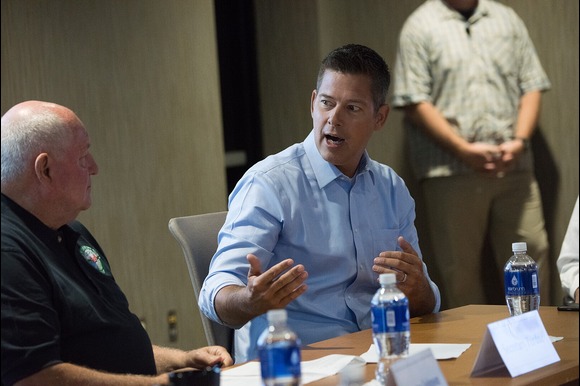Duffy Announces Drastic Flight Reductions
US Transportation Secretary Sean Duffy has warned that air travel capacity across the country could be slashed by up to 10% at around 40 major airports if the ongoing government shutdown continues.
The move, which will mainly affect domestic flights, comes amid growing fatigue and stress among air traffic controllers, many of whom have been working without pay.
At a joint press briefing, Federal Aviation Administration (FAA) chief Bryan Bedford said the decision was made reluctantly but out of necessity to preserve aviation safety.
Shutdown Forces Federal Workers to the Brink
The shutdown—now the longest in US history—has left around 1.4 million federal employees either on unpaid leave or working without pay.
Among them are air traffic controllers, airport security staff, and national park rangers, all struggling with rising financial and emotional strain.
Union leaders say some employees have become ill with stress, while others have taken second jobs just to make ends meet.
“It is unusual,” FAA Administrator Bedford said, “just as the shutdown itself is unusual—just as the fact that our controllers haven’t received a paycheck in a month is unusual.”
Gradual Reductions: From 4% to 10%
According to reports from Reuters, the FAA will begin cutting 4% of domestic flights on Friday, with the figure rising to 5% on Saturday, 6% on Sunday, and reaching the full 10% next week.
The list of the affected airports—all major hubs—will be released on Thursday, officials said.
Early reports suggest that Hartsfield-Jackson Atlanta International, Dallas/Fort Worth International, Denver International, Chicago O’Hare International, and Los Angeles International Airport (LAX) are among those expected to see cancellations.
The cuts could impact between 3,500 and 4,000 flights per day, though international flights are expected to continue operating normally.
Safety and Staffing Concerns
FAA chief Bedford emphasized that the reduction was essential to “maintain the safest airspace system in the world.”
“We are seeing pressures build in a way that, if left unchecked, could compromise our ability to safely manage the system,” he said.
Secretary Duffy reassured travelers that air travel remains safe, saying the cancellations are a preventive measure to ensure the system remains efficient and reliable.
He added that if the shutdown drags on, “additional restrictions may be required.”
Airlines Brace for Major Disruptions
Major US airlines are preparing for turbulence in their operations.
American Airlines, the country’s second-largest carrier, said it is waiting for more information from the FAA before finalizing which routes will be affected.
“We expect the vast majority of our customers’ travel will be unaffected,” the company said in a statement.
Southwest Airlines also acknowledged that it is assessing the situation and pledged to notify passengers as soon as possible.
“We continue to urge Congress to immediately resolve its impasse and restore the National Airspace System to its full capacity,” a spokesperson said.
Delta Airlines declined to comment, while other carriers have yet to issue formal statements.
The Shutdown’s Ripple Effect on Aviation
Since the shutdown began on October 1, airports across the US have already felt its effects.
Some have been forced to delay or ground flights for hours after controllers called in sick. Others have had to borrow staff from nearby airports to maintain operations.
Earlier this week, Secretary Duffy hinted at the looming flight cancellations, warning that half of the nation’s 30 busiest airports were experiencing staff shortages.
Workers Speak Out: ‘No Money for Gas’
Nick Daniels, president of the union representing more than 20,000 aviation workers, painted a grim picture of life for unpaid controllers.
“Air traffic controllers are texting me saying, ‘I don’t even have enough money to put gas in my car to get to work,’” Daniels told CNN.
“We base what we do on predictability. Right now, there is no predictability.”
A controller speaking to NPR described the situation as reaching a “tipping point.”
“This is about the point where people start getting fed up,” they said.
Another controller added, “It degrades safety if people are sick and I have to do their jobs along with mine.”
Working Two Jobs to Survive
In an essay for MSNBC, one air traffic controller, a single father, revealed he had taken a second job with DoorDash after his daily FAA shift just to buy food for his children.
“Like many families, we didn’t plan for a shutdown,” he wrote. “Yet the bills don’t stop.”
Secretary Duffy said the situation is “deeply concerning,” noting that some controllers are taking on side jobs, raising worries about fatigue and divided focus.
“They have to make a terrible choice,” Duffy said on Sunday. “Do they go to work without pay—or do they drive for Uber, DoorDash, or wait tables to feed their families?”
Uncertain Future for US Air Travel
With the shutdown showing no signs of ending, the coming days are expected to bring major disruptions for millions of passengers.
Officials say that unless Congress reaches a funding agreement soon, more severe restrictions on domestic air travel could follow.
The Biden administration has not yet announced any emergency measures, but pressure is mounting from both airlines and unions to bring an end to the standoff.
As FAA chief Bedford warned:
“Our system is built on precision and people. Without pay and rest, we risk losing both.”






